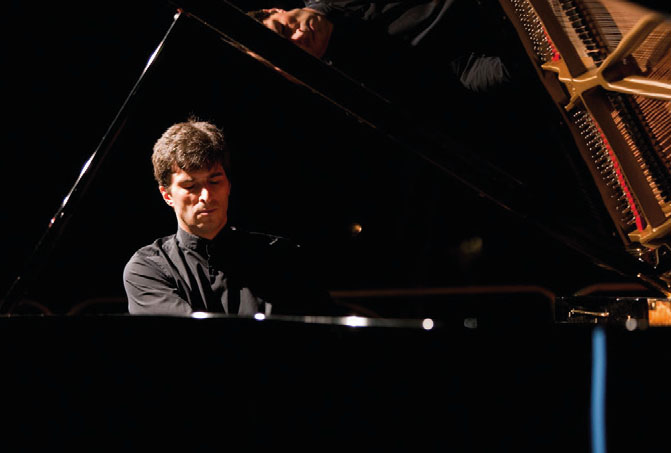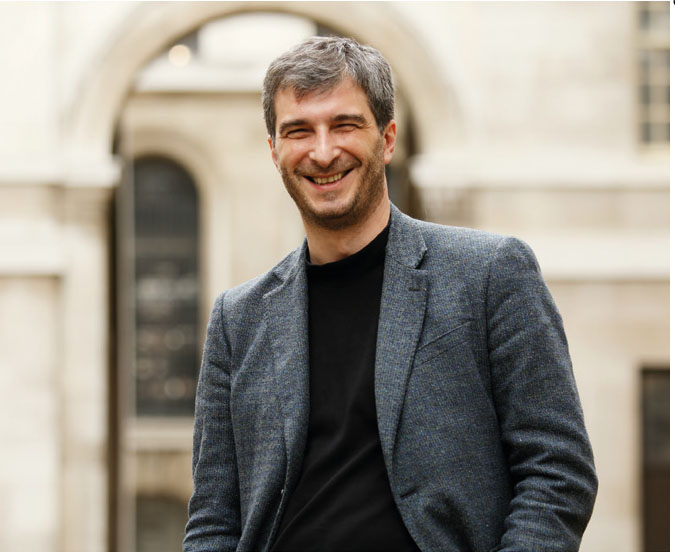
Could you tell me a little about your introduction to music?
I started to play the piano when I was eight years old, but when I was four I was already telling my parents, who are not musicians, that I wanted to play piano. It took them about four years for them to understand that I was quite serious about it.
What was it about the piano?
I was just attracted by music and musical instruments and then, for reasons I never really understood, I was fixated on the piano. It was probably the shape and the size of the piano but it just became the instrument I wanted to play.
I know what you mean – I'm a flautist but the piano has always been the instrument I wish I played.
Right? There's just something attractive about it! I remember there was a show on TV and there was a pianist playing – a bad pianist, I can say now – but I was totally in love with him and I wanted to be like him.
How did you come to teach piano?
That story starts when I was young. I went to a small music school close to Florence, where I was born. It's a school for everyone, ages three to eighty-five, and my teacher was very good. Years later, when I returned from the USA, where I was studying, I was offered a position. I had students of all abilities and ages but it was more focussed on getting people involved with music rather than teaching proper piano playing – at the beginning at least. Soon, many of my students – particularly the little ones – were advancing quickly and many of them are now professional musicians. It's nice to have those results, to make you want to do even better. I started teaching in a state conservatoire in Italy, where I was teaching until 31 August when I had to step down to do this job full-time. I had already been teaching here for five years before, quite unexpectedly, being made head of keyboard.
What brought you to Trinity Laban?
I was happy in Italy but I was lacking an international atmosphere – London is obviously one of the most international cities and there was an open position so I applied, mainly to see how it would go. The interview was my first visit to London!
A good job you liked it, then!
Absolutely! I was thrilled. The atmosphere was alive with international students coming from all over the world – I like the diversity and the mix of culture. Things develop well in that kind of environment.
What does the new job entail?
The department contains piano, organ and harpsichord – but the biggest part is the piano. The others are not my instruments but I'm already working on developing that side of the department.
Is it that also a desire for diversity?
Yes. I think so much is changing in music that is both difficult and exciting. I think pianists need to be multiskilled – it's good to have some knowledge of harpsichord and organ while becoming very good pianists. You cannot play Mozart without knowing the fortepiano or Bach without knowing how it is meant to be played on the harpsichord. If I make that part of the department stronger, everything improves.
What else do you want your students to learn?
Our goal is to give them all the tools to face the world and to develop their profession in that world. They must be good musicians but they must be aware of how this world operates, what possibilities and opportunities there are. It is important that they know how to find an audience. At my school in Italy, it didn't matter who was good and who was bad as long as they were involved in a music environment. We would organise concerts and have them come in and listen. Teaching music isn't only about making musicians but also about creating an audience.
In London, the problem doesn't exist as much, but in other places, it's a big issue. When I was young, I used to go every weekend to a concert in a theatre in Florence and it was always packed. When I go now, it's half-full, at most, and it's all old people – the same people who were going when I went! They make me feel young but it also makes me sad. From a very early age, we need to educate people about classical music. They don't get it from media, the internet or their mates. I'm not saying commercial music is bad but it's not the only thing. There's a prejudice against classical music, that it's for old people or boring people, but that's a belief that isn't true.

For De Simone, it's important for musicians to talk to their audience
How do you convince people that classical music is for them?
We can learn a lot from other kinds of artists. Here, we have a class called ‘engaging an audience’ which is about how you attract an audience, but also teaches students how to communicate with their audience. I think it is important to give a little speech before you play to make people understand what you are doing and why you are playing this particular piece and to make them feel acknowledged. When I do that, the feedback I get is about how much more they were able to enjoy the piece because I had given them that connection. Students also need to communicate while they are playing and this is the most difficult thing to do.
Look at Freddie Mercury, the way he moved about the stage and engaged his audience. He made them sing! That man had so much power and charisma. Even if not to that level, we need to develop that sort of audience relationship. Students don't always understand how they can do it, but it's something they need to be engaged with. Those big stars know how to put on a show. I don't think classical musicians need to copy that but they should look at the way the stars do it and how it helps to build an audience connection. You can find it within classical music – Bernstein, for example, knew how to perform on a stage. Maybe it's natural for them but we can study it.
Mozart reportedly got that reaction, so it's not beyond classical music.
Exactly – there's definitely something about that charisma. Some people have that quality where they can just walk into a room and, you don't understand why, but you are just drawn to them. Performers are giving people an experience and we are drawn to that – find that in your music and the audience will see that in you. We're trying to teach the knowledge but the main goal is to bring out the personality – to let it come out. Sometimes that means being flexible with the rules and seeing what happens. You don't always need to play like you're supposed to play – an artist needs to be open to develop in any direction. As teachers, we need to help them on that path.
What are you looking for when people audition?
At undergraduate, I am looking for something interesting that could be developed. They need a certain level, abilities and skills, but the most important thing is to see how the musician approaches the piano, how they sit at the piano and how they relate to the music and the instrument. Sometimes I am surprised but I usually know before they start playing if I am about to get something incredible. I'm not looking for great talent to be out when you come to us – it's my job to recognise it and encourage it.

De Simone has already been at Trinity Laban for five years as professor of piano © JAMES KEATES
So there's not a set of boxes to tick?
We are looking for personalities and teachers should encourage that in their students. I think the focus on competitions and exams, while important and useful – and something we prepare students for – can distract from the music. As Bartók said, ‘competitions are for horses, not artists’.
Music is something more, something that is developed with others. I know many winners of competitions who aren't otherwise working – what's the point? Each student must do the best they can. Diversity is more important than doing the same Chopin Études at a certain speed – though you do need to know that!
I hear that you've got some exciting releases coming up?
I'm going to start working with Bärenreiter on a publication soon. There's also a CD on Brahms that I will be recording in the winter. Brahms was a big part of my training. I grew up hearing his great music, so deep and so perfect. I'm always attracted by synthesis – although Brahms is a late Romantic, he embodies the movement. You can't move one note to another place – he just found a way to make everything work in the proper way. It's a balance that I'm totally in love with. This year, the department are doing a Brahms festival – very exciting!
Is there anything else to look forward to?
It's an incredible time for the department because in just over a week, we'll have five new Steinway Bs – I flew out to Hamburg with my predecessor, Peter Tuite, to choose them. For the first time in many years, the department will have six rooms that are only to be used by pianists with these new Steinways and a new Yamaha. It wasn't like this before – we had good pianos but now students will get to play one of these from their first day. It's amazing and the whole department is very happy – I'm glad that Trinity Laban can offer these piano facilities to my students.








